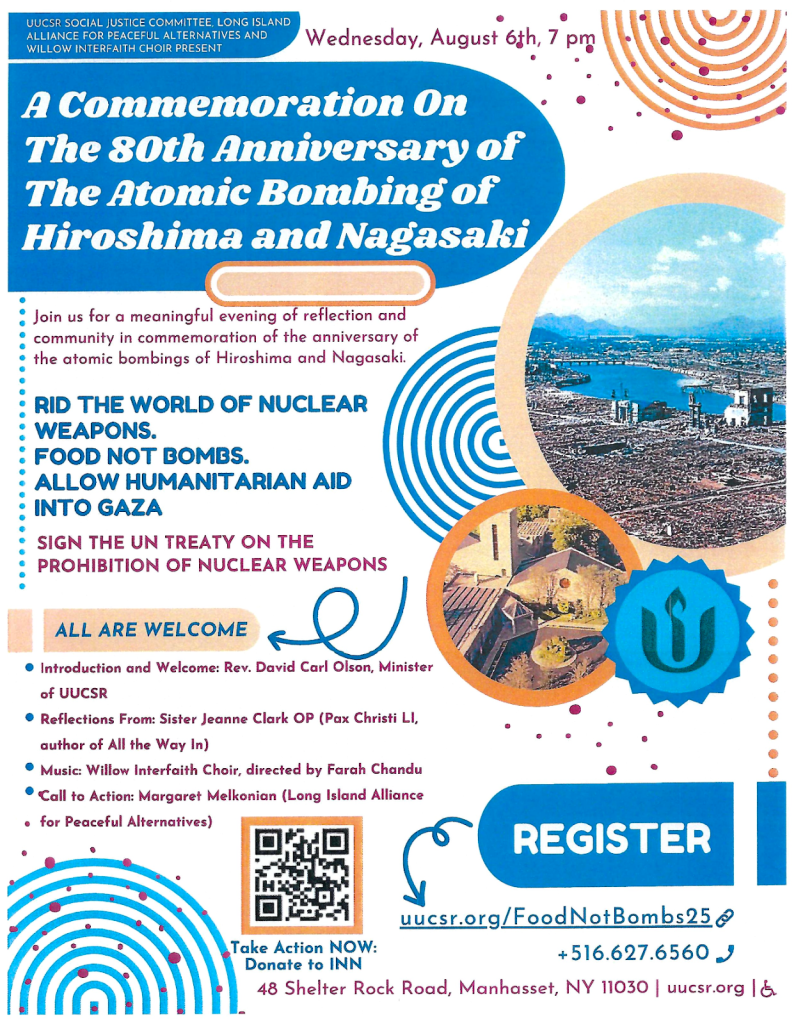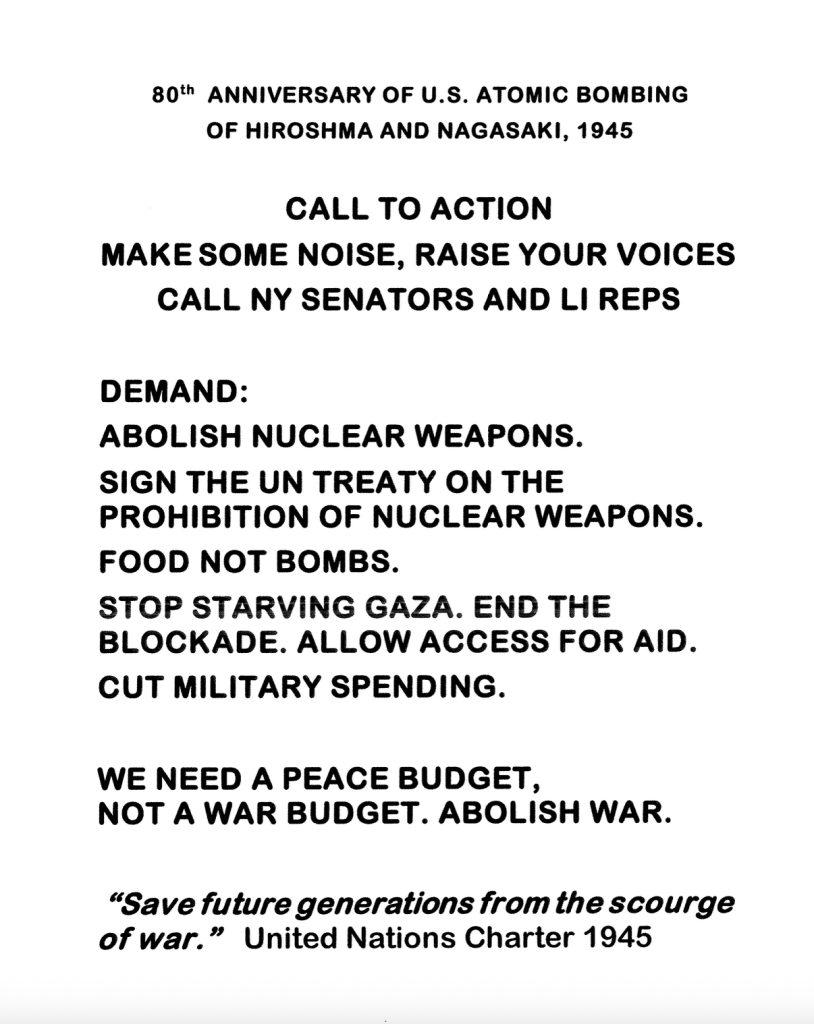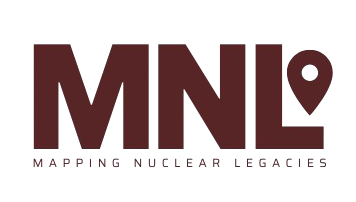On August 6, 2025, the Unitarian Universalist Congregation at Shelter Rock, located in Manhasset, NY, hosted a commemoration for the 80th anniversary of the atomic bombing of Hiroshima. The theme of the event was Food Not Bombs, with the program focusing on the good that could be done with the money currently being spent on nuclear proliferation. Overall, the commemoration concentrated on recognizing the impact of bombs in the past, shifting our current mindset to how we can make changes for future generations.
The commemoration opened with a performance by the Willow Interfaith Choir, a New York-based women’s musical group, directed by Farah Chandu, then formally commenced with a sermon by Minister David Carl Olson. He first discussed how every Sunday the congregation makes a promise to “dwell together in peace,” and part of fulfilling this promise is collective action to rid the world of nuclear war. He brought to his sermon a recognition of his perspective as a working-class man with many family members having previously served in combat, while he himself is a conscientious objector. He also talked about his past work with Japanese artists and in Korean communities, and the unique considerations of the Korean population with regard to the atomic bombings of Hiroshima and Nagasaki.
To conclude the sermon, the Willow Interfaith Choir performed the poem “Hiroshima Child” by Nazim Hikmet through song. This poem portrays the story of a young child who died in the Hiroshima bombings, exploring the destruction of innocence and the enduring pain of early deaths caused by nuclear bombs. The choir next performed music with words by Sadako Sasaki, a young girl who was afflicted with leukemia as a result of the bombing of Hiroshima. After her diagnosis, she began folding hundreds of origami cranes, which, after her death, became a universal symbol of hope and peace. Following the performance, origami cranes folded by choir members were distributed to audience members to honor Sasaki’s message.
Afterwards, Sister Jean Clark of Pax Christi, an international Catholic peace movement, and author of the memoir “All the Way Down,” spoke. She opened by acknowledging that we live today with the collective trauma of the lives lost in Hiroshima and Nagasaki. This collective trauma is exacerbated by the awareness that at any moment, a nuclear weapon could end life on Earth. She centered her speech around Franz Jägerstätter’s resistance to Nazi Germany. Jägerstätter was an Austrian Catholic farmer who resisted serving in Hitler’s army and was imprisoned and beheaded for his refusal. While imprisoned, he was visited by a chaplain who asked how he had the strength to persevere, to which he recounted a vision he had of a white train crowded with people and heard “a voice said to me, ‘This train is going to hell.’” He viewed this train as an image of Nazism, its masses of followers.
Sister Clark heard this story from Daniel Berrigan SJ, a priest, anti-war activist, poet, and author. Upon hearing this story, she realized that today the train is the nuclear arms race, and she was on it, which prompted her lifetime of anti-nuclear activism. In 1982, Sister Clark lived with Jim Douglas, founder of the Ground Zero Campaign, and his wife at Naval Base Kitsap on the Kitsap Peninsula in Washington state. There, she joined the emerging community opposing the development of the Trident submarine—which is now housed at Naval Base Kitsap— which eventually became the starting point for the Ground Zero movement. When joining the community, she was given a brochure with an image of a white train and a quote relating Tridents to Auschwitz. As Sister Clark and Douglas saw the white trains continuously delivering weapons to the base, she was inspired to accelerate her fight against the development of nuclear weapons.
Following her personal experience, she urged the audience to take action, stating that we all must get in front of the train by resisting taxes that fuel war and educating the public that deterrence is no longer a viable or safe possibility. She stated that this transformation is reliant upon a new understanding of the human identity, that “we are one and whole and connected to everything and every other human, to the stars and galaxies, to every plant and every tree, to every mountain and the oceans and river and streams.”
Sister Clark’s reflection concluded with the poem “Singularity” by Marie Howe and a final call to make the imagined world of John Lennon a reality by reconnecting with our ancestral ways. Her reflection was followed by the Willow Interfaith Choir’s performance of “Song of Sarajevo” by Judy Collins, as requested by Sister Clark.
The commemoration concluded with a speech by Margaret Melkonian of the Long Island Alliance for Peaceful Alternatives. She opened with her goals: to remember, to drive, to commit to the work, and to save future generations. Melkonian called upon the theme of the night to ask the audience to ponder why there are starving people in Sudan and Gaza while the United States pours 87 billion dollars into nuclear development. She then reminded us that previous treaties and other diplomatic actions started with people; therefore, we need to take action today to protect the world from nuclear violence. Melkonian then encouraged the audience to call their representatives to urge them that the US must sign the UN Treaty on the Prohibition of Nuclear Weapons. She next brought out a metal pot and spoon, banging them together and declaring that we must make noise in order to raise enough awareness to ignite change—just like the noise made after 9/11. She then explained some details as to how the audience could get involved in the fight. She concluded by saying, “We don’t want just to make noise, we want to make beautiful music.”
The commemoration concluded with a performance of “Peace Train” by Cat Stevens, sung by the Willow Interfaith Choir.

Related Sites

